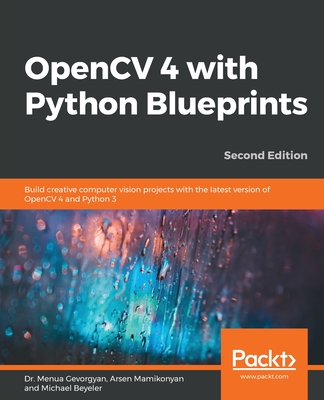OpenCV 4 with Python Blueprints, Second Edition
暫譯: OpenCV 4 與 Python 實作藍圖(第二版)
Gevorgyan, Menua, Mamikonyan, Arsen, Beyeler, Michael
- 出版商: Packt Publishing
- 出版日期: 2020-03-20
- 售價: $1,950
- 貴賓價: 9.5 折 $1,853
- 語言: 英文
- 頁數: 366
- 裝訂: Quality Paper - also called trade paper
- ISBN: 1789801818
- ISBN-13: 9781789801811
-
相關分類:
影像辨識 Image-recognition、Python、程式語言
-
相關翻譯:
OpenCV 4.0 + Python 機器學習與電腦視覺實戰 (簡中版)
立即出貨 (庫存=1)
買這商品的人也買了...
-
 Python 專家實踐指南|搭乘專業開發者的學習便車 (The Hitchhiker's Guide to Python: Best Practices for Development)
Python 專家實踐指南|搭乘專業開發者的學習便車 (The Hitchhiker's Guide to Python: Best Practices for Development)$580$458 -
 為你自己學 Git
為你自己學 Git$500$390 -
 Python 資料科學學習手冊 (Python Data Science Handbook: Essential Tools for Working with Data)
Python 資料科學學習手冊 (Python Data Science Handbook: Essential Tools for Working with Data)$780$616 -
 Python 技術手冊, 3/e (Python in a Nutshell: A Desktop Quick Reference, 3/e)
Python 技術手冊, 3/e (Python in a Nutshell: A Desktop Quick Reference, 3/e)$880$695 -
 $1,118Advanced Deep Learning with Keras: Applying GANs and other new deep learning algorithms to the real world (Paperback)
$1,118Advanced Deep Learning with Keras: Applying GANs and other new deep learning algorithms to the real world (Paperback) -
 還在漫無頭緒?一本書帶你走完 Python 深度學習
還在漫無頭緒?一本書帶你走完 Python 深度學習$690$587 -
 Machine Learning for Healthcare Analytics Projects: Build smart AI applications using neural network methodologies across the healthcare vertical market
Machine Learning for Healthcare Analytics Projects: Build smart AI applications using neural network methodologies across the healthcare vertical market$1,190$1,131 -
 Mastering OpenCV 4 with Python (Paperback)
Mastering OpenCV 4 with Python (Paperback)$1,645$1,563 -
 $403OpenCV 4 電腦視覺項目實戰, 2/e
$403OpenCV 4 電腦視覺項目實戰, 2/e -
 Machine Learning for OpenCV 4 : Intelligent algorithms for building image processing apps using OpenCV 4, Python, and scikit-learn, 2/e (Paperback)
Machine Learning for OpenCV 4 : Intelligent algorithms for building image processing apps using OpenCV 4, Python, and scikit-learn, 2/e (Paperback)$1,715$1,629 -
 AIOT 與 OpenCV 實戰應用:Python、樹莓派、物聯網與機器視覺
AIOT 與 OpenCV 實戰應用:Python、樹莓派、物聯網與機器視覺$480$379 -
 $1,674Learning OpenCV 4 Computer Vision with Python 3, 3/e (Paperback)
$1,674Learning OpenCV 4 Computer Vision with Python 3, 3/e (Paperback)
商品描述
OpenCV is a native cross-platform C++ library for computer vision, machine learning, and image processing. It is increasingly being adopted in Python for development. This book will get you hands-on with a wide range of intermediate to advanced projects using the latest version of the framework and language, OpenCV 4 and Python 3.8, instead of only covering the core concepts of OpenCV in theoretical lessons. This updated second edition will guide you through working on independent hands-on projects that focus on essential OpenCV concepts such as image processing, object detection, image manipulation, object tracking, and 3D scene reconstruction, in addition to statistical learning and neural networks.
You’ll begin with concepts such as image filters, Kinect depth sensor, and feature matching. As you advance, you’ll not only get hands-on with reconstructing and visualizing a scene in 3D but also learn to track visually salient objects. The book will help you further build on your skills by demonstrating how to recognize traffic signs and emotions on faces. Later, you’ll understand how to align images, and detect and track objects using neural networks.
By the end of this OpenCV Python book, you’ll have gained hands-on experience and become proficient at developing advanced computer vision apps according to specific business needs.
商品描述(中文翻譯)
OpenCV 是一個原生的跨平台 C++ 函式庫,專為計算機視覺、機器學習和影像處理而設計。它在 Python 中的開發應用越來越廣泛。本書將帶您實作一系列中級到高級的專案,使用最新版本的框架和語言,即 OpenCV 4 和 Python 3.8,而不僅僅是涵蓋 OpenCV 的核心概念的理論課程。這本更新的第二版將指導您進行獨立的實作專案,專注於基本的 OpenCV 概念,例如影像處理、物體偵測、影像操作、物體追蹤和 3D 場景重建,此外還包括統計學習和神經網絡。
您將從影像濾鏡、Kinect 深度感測器和特徵匹配等概念開始。隨著進步,您不僅會實作重建和視覺化 3D 場景,還會學習如何追蹤視覺上顯著的物體。本書將幫助您進一步提升技能,展示如何識別交通標誌和臉部情緒。之後,您將了解如何對齊影像,以及如何使用神經網絡來偵測和追蹤物體。
在這本 OpenCV Python 書籍的結尾,您將獲得實作經驗,並能根據特定的商業需求熟練開發高級計算機視覺應用程式。
作者簡介
Dr. Menua Gevorgyan
Dr. Menua Gevorgyan is an experienced researcher with a demonstrated history of working in the information technology and services industry. He is skilled in computer vision, deep learning, machine learning, and data science as well as having a lot of experience with OpenCV and Python programming. He is interested in machine perception and machine understanding problems, and wonders if it is possible to make a machine perceive the world as a human does.
Arsen Mamikonyan
Arsen Mamikonyan is an experienced machine learning specialist with demonstrated work experience in Silicon Valley and London, and teaching experience at the American University of Armenia. He is skilled in applied machine learning and data science and has built real-life applications using Python and OpenCV, among others. He holds a master's degree in engineering (MEng) with a concentration on artificial intelligence from the Massachusetts Institute of Technology.
Michael Beyeler
Michael Beyeler is a postdoctoral fellow in neuroengineering and data science at the University of Washington, where he is working on computational models of bionic vision in order to improve the perceptual experience of blind patients implanted with a retinal prosthesis (bionic eye). His work lies at the intersection of neuroscience, computer engineering, computer vision, and machine learning. He is also an active contributor to several open source software projects, and has professional programming experience in Python, C/C++, CUDA, MATLAB, and Android. Michael received a PhD in computer science from the University of California, Irvine, and an MSc in biomedical engineering and a BSc in electrical engineering from ETH Zurich, Switzerland.
作者簡介(中文翻譯)
梅努阿·蓋沃爾基安博士
梅努阿·蓋沃爾基安博士是一位經驗豐富的研究員,在資訊科技和服務業擁有顯著的工作歷史。他擅長於計算機視覺、深度學習、機器學習和數據科學,並且在 OpenCV 和 Python 編程方面有豐富的經驗。他對機器感知和機器理解問題感興趣,並思考是否有可能讓機器像人類一樣感知世界。
阿爾森·馬米科尼安
阿爾森·馬米科尼安是一位經驗豐富的機器學習專家,曾在矽谷和倫敦工作,並在亞美尼亞美國大學擔任教職。他擅長於應用機器學習和數據科學,並使用 Python 和 OpenCV 等技術構建了實際應用。他擁有麻省理工學院的工程碩士學位(MEng),專注於人工智慧。
邁克爾·貝耶勒
邁克爾·貝耶勒是華盛頓大學神經工程和數據科學的博士後研究員,他正在研究仿生視覺的計算模型,以改善植入視網膜假體(仿生眼)的盲人患者的感知體驗。他的工作位於神經科學、計算機工程、計算機視覺和機器學習的交叉點。他也是幾個開源軟體專案的活躍貢獻者,並在 Python、C/C++、CUDA、MATLAB 和 Android 等方面擁有專業的編程經驗。邁克爾在加州大學爾灣分校獲得計算機科學博士學位,並在瑞士蘇黎世聯邦理工學院獲得生物醫學工程碩士學位和電機工程學士學位。















